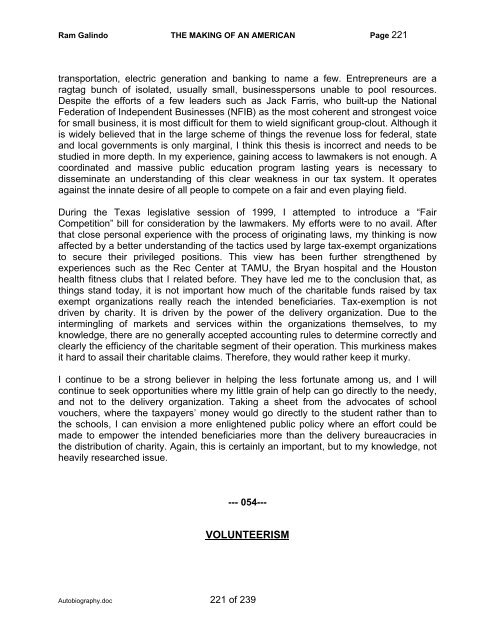Autobiography - The Galindo Group
Autobiography - The Galindo Group
Autobiography - The Galindo Group
Create successful ePaper yourself
Turn your PDF publications into a flip-book with our unique Google optimized e-Paper software.
Ram <strong>Galindo</strong> THE MAKING OF AN AMERICAN Page 221<br />
transportation, electric generation and banking to name a few. Entrepreneurs are a<br />
ragtag bunch of isolated, usually small, businesspersons unable to pool resources.<br />
Despite the efforts of a few leaders such as Jack Farris, who built-up the National<br />
Federation of Independent Businesses (NFIB) as the most coherent and strongest voice<br />
for small business, it is most difficult for them to wield significant group-clout. Although it<br />
is widely believed that in the large scheme of things the revenue loss for federal, state<br />
and local governments is only marginal, I think this thesis is incorrect and needs to be<br />
studied in more depth. In my experience, gaining access to lawmakers is not enough. A<br />
coordinated and massive public education program lasting years is necessary to<br />
disseminate an understanding of this clear weakness in our tax system. It operates<br />
against the innate desire of all people to compete on a fair and even playing field.<br />
During the Texas legislative session of 1999, I attempted to introduce a “Fair<br />
Competition” bill for consideration by the lawmakers. My efforts were to no avail. After<br />
that close personal experience with the process of originating laws, my thinking is now<br />
affected by a better understanding of the tactics used by large tax-exempt organizations<br />
to secure their privileged positions. This view has been further strengthened by<br />
experiences such as the Rec Center at TAMU, the Bryan hospital and the Houston<br />
health fitness clubs that I related before. <strong>The</strong>y have led me to the conclusion that, as<br />
things stand today, it is not important how much of the charitable funds raised by tax<br />
exempt organizations really reach the intended beneficiaries. Tax-exemption is not<br />
driven by charity. It is driven by the power of the delivery organization. Due to the<br />
intermingling of markets and services within the organizations themselves, to my<br />
knowledge, there are no generally accepted accounting rules to determine correctly and<br />
clearly the efficiency of the charitable segment of their operation. This murkiness makes<br />
it hard to assail their charitable claims. <strong>The</strong>refore, they would rather keep it murky.<br />
I continue to be a strong believer in helping the less fortunate among us, and I will<br />
continue to seek opportunities where my little grain of help can go directly to the needy,<br />
and not to the delivery organization. Taking a sheet from the advocates of school<br />
vouchers, where the taxpayers’ money would go directly to the student rather than to<br />
the schools, I can envision a more enlightened public policy where an effort could be<br />
made to empower the intended beneficiaries more than the delivery bureaucracies in<br />
the distribution of charity. Again, this is certainly an important, but to my knowledge, not<br />
heavily researched issue.<br />
--- 054---<br />
VOLUNTEERISM<br />
<strong>Autobiography</strong>.doc 221 of 239


